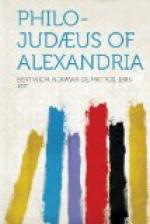seems more reasonable to account for the correspondence
in the two Midrashim. It should be remembered
that until the second century of the common era the
mass of Jewish tradition was a floating and developing
body of opinion not consigned to writing or formalized,
but handed down by word of mouth from teacher to pupil,
and preacher to congregation: in this way it
was diffused throughout the mind of the race, indefinitely
and, to some extent, unconsciously shaping its thought.
The detailed points of agreement between Philo and
the Talmud and Midrash are not of great moment in
themselves, but they are the signs of a unity of development
and the catholicity of Judaism in the East and West.
Doubtless the development was more national and at
the same time more legal in Judaea, in Alexandria
more Hellenistic and philosophical, but there is a
common spiritual bond between the two expressions,
pious images, fancies, similes, interpretations which
they share. They are, as it were, children of
one family, and despite the varying influences of
environment they maintain a family resemblance.
With the Sibylline oracles we may compare Daniel and
the Psalms of Solomon; with Aristeas and his fellow-Apologists,
Josephus; with the allegorical commentaries of Philo,
the Midrashim. Modern scholars have gone far to
prove that Philo was the expounder of an Hellenic
Midrash upon the Bible, in which were gathered the
thoughts and ideas that had been brought to Egypt
by the Jewish settlers, modified, no doubt, by Greek
influences, but still bearing the stamp of their origin.
Philo, then, appears in the direct line of the tradition
which from the time of the Great Synagogue was disseminated
through two channels, the schools of Palestine and
the writers of Alexandria. He developed the national
Jewish theology in a literary form, which made it available
for the world, but with him the tradition as a Jewish
tradition ends; in its further Hellenistic development
it departed entirely from its original principles.
It is natural that the larger number of parallels
between Philo and the rabbis is to be found in the
Haggadic portions of Talmudic teaching, for the Haggadah
represents the same spirit as underlies Philo’s
work, though in a more peculiarly Jewish form; it is
an allegory, a play of fancy, a tale that points a
moral, or illustrates a question. It had, too,
largely the same origin, for it gathered together
the popular discourses given in the synagogue on the
Sabbaths. Yet the relation of Philo to the other
domain of the Talmud, the code of life, or the Halakah,
is of great interest; for, as we have seen,[286] the
Alexandrian community had a Sanhedrin of their own,
of which Philo’s brother was the president, and
he himself probably a member; and in his exposition
of the “Specific Laws” he has preserved
for us the record of certain interpretations of the
Jewish code, which are illuminating as much by their
difference from, as by their agreement with, the practices




